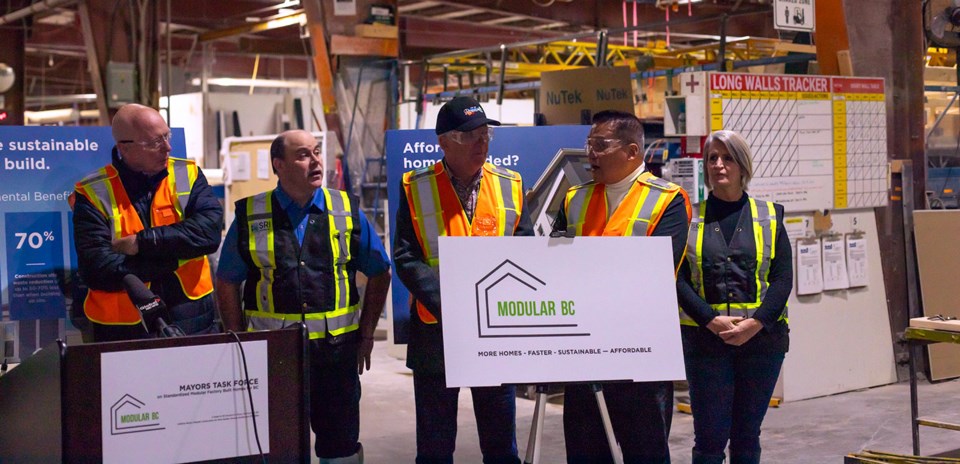The mayor of Prince George is one of five municipal leaders to join a new task force aimed at streamlining the development and approval of modular homes as part of the effort to boost BC’s affordable housing supply.
Modular BC, a non-profit advocacy group, announced the task force, which includes Prince George Mayor Simon Yu, in Kelowna on Friday, Nov. 22.
Modular homes are built in a factory-like setting rather than constructed on-site. The separate components, or modules, are then transported to the home's site and assembled.
"Municipalities across British Columbia are increasingly being called upon to deliver critical housing supply at prices people can afford,” said Modular BC spokesperson Paul Binotto in a release.
“With the BC Mayors Task Force, we are ready to support the province and make BC a North American leader in delivering a high-quality, fast, affordable modular housing program in communities across the province.”
According to Binotto, modular homes can be built in a couple of months instead of a year.
The members of the task force are Yu, Burnaby Mayor Mike Hurley, Pentiction Mayor Julius Bloomfield, Nanaimo Mayor Leonard Krog and Williams Lake Mayor Surinderpal Rathor.
The task force has been given the goal of streamlining the design, construction and approval of modular homes. The non-profit said in a media release that modular homes can be built more quickly than traditional construction methods and can be less wasteful to build.
Yu told The Citizen on Monday that the task force was Hurley’s idea and that the conversation over its formation goes back two or three months.
The mayors involved represent municipalities of different sizes from a variety of regions, but Yu said that more importantly, Hurley was looking for mayors with experience dealing with construction and building trades.
As an engineer, Yu said he has previously worked in panelized construction, building homes in Indonesia in the aftermath of a tsunami. Hurley is a carpenter by trade, Bloomfield has worked in real estate, Rathor has been involved in the lumber industry and Krog understands provincial government as a former MLA.
On top of that, Yu said, Hurley was looking for mayors with experience dealing with Bill 44, the provincial government’s legislation promoting the construction of small-scale, multi-unit housing.
“I believe (Hurley) wants to see if we can collectively find a way to work with industry to find some standard designs that municipalities can pre-approve the design, the zoning so people can shorten their application process and use these designs through various pre-fab modular manufacturers.”
Yu said he hopes that increased local modular home construction won’t just benefit those who assemble the homes, but the forestry industry and trades who assemble plumbing, ventilation and other systems.
At this point, Yu said he’ll be the only one from the city working on the project, though he said zoning changes relating to modular homes may need to come before council in future. He said he’ll also be speaking with local members of the modular housing industry.
Prince George is home to multiple modular home dealers as well as a manufacturer, Winton Homes & Cottages.
At one of those dealers, Pine Ridge Modular, operations manager Andrew Cuthbertson said modular homes can be up to 30 per cent cheaper to buy than traditional homes.
Pine Ridge gets the modular homes it sells from SRI Homes BC’s Kelowna factory.
One of the biggest obstacles Pine Ridge encounters, Cuthbertson said, is that financial institutions can be hesitant to grant mortgages for modular homes.
“Banks haven’t caught up to the fact that we don’t build them like we used to in the '60s and '70s,” he said. “The other (roadblock) is, especially in Prince George, there’s still lots of areas ... that don’t allow modular into their new developments.”
Compared to those past decades, Cuthbertson said, modular home builders have to follow far more regulations and still meet the same standards as any other homes.
He said you could walk into any of the homes they sell and not know that it was built in a factory.
Beyond single-family homes, he said modular homes can be built with multiple stories and with multiple dwelling units. Recently, Pine Ridge delivered a modular daycare up to Chetwynd.
“You see places like Burns Lake who have jumped on board with modular and it’s amazing what they’re doing out there and we’re hoping the same thing can happen in Prince George,” Cuthbertson said.
Reached by phone from Burnaby, Binotto said work on the standardized designs is already underway.
He said modular homes can be made faster than so-called stick-built homes because they’re essentially made on a production line. Standardized designs will make the permitting process easier and being made inside means construction can take place regardless of the outside weather.
“And most of the build occurs in the factory, so when we come there and we put the units together, the site’s already done,” Binotto said. “Instead of a year or so, we’re talking a couple of months.”
Comparing the cost of a modular home to other types is difficult, Binotto said, because of the number of types of homes. However, he said that the prices of modular homes aim to remain consistent.
Some people think modular homes are the same thing as trailers, Binotto said, but there’s a difference.
"It’s not (a trailer),” he said. “These homes have won awards. They’re beautiful homes. You could walk by many of them and you wouldn't know it's a modular home.”
The goal isn’t to prevent the construction of other types of homes, Binotto said, but to promote a made in BC industry that could benefit sectors like forestry and serve as a source of employment.



